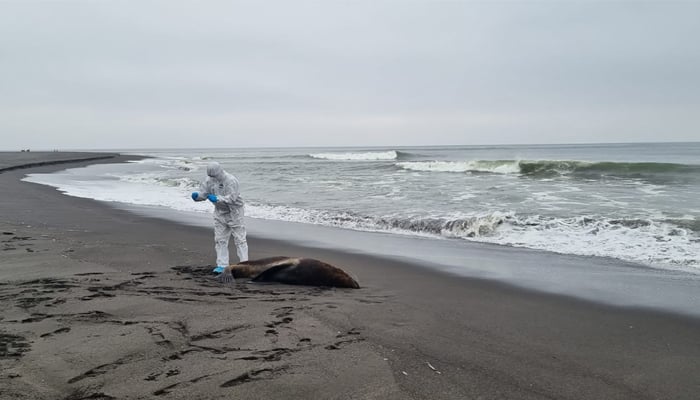Over 50 sea lions die in Argentina from bird flu; officials fear jump in humans
Patagonian environmental authority says another 50 dead specimens have been counted... with symptoms compatible with avian influenza
Officials in Argentina said Tuesday a large number of sea lions have died due to an outbreak of bird flu which continued to infect the animals, with officials sounding alarm that this virus may jump into humans "very easily".
Recently, there were reports from animal health authorities in the country that scores of sea lions have been found dead on several coastal areas of Argentina's Atlantic coast — south of the capital Buenos Aires to Santa Cruz near the southern tip of the continent.
A statement from a Patagonian environmental authority stated: "Another 50 dead specimens have been counted... with symptoms compatible with avian influenza."
According to AFP, "the number of dead is rising and there is no veterinary treatment for these cases."
Authorities have asked the population to avoid beaches along Argentina's roughly 5,000-kilometer (3,100-mile) coastline where cases have been reported.
Sea lions are marine mammals, like seals and walruses and the adult males can weigh about 300 kilograms (660 pounds).
The H5N1 bird flu has typically been confined to seasonal outbreaks, but since 2021 cases have emerged year-round, and across the globe, leading to what experts say is the largest outbreak ever seen.
Hundreds of sea lions were reported dead in Peru earlier this year, as the virus has ravaged bird populations across South America.
There is no treatment for bird flu, which spreads naturally between wild birds and can also infect domestic poultry.
Avian influenza viruses do not typically infect humans, although there have been rare cases.
However, the outbreak has infected several mammal species, such as farmed minks and cats, and the World Health Organization warned in July this could help it adapt to infect humans more easily.
"Some mammals may act as mixing vessels for influenza viruses, leading to the emergence of new viruses that could be more harmful to animals and humans," the WHO said in a statement.
-
Lindsay Lohan on 'confusing' teen fame after 'Mean Girls': 'I should have listened to my mom and dad'
-
Savannah Guthrie mom update: 'Today' show sees huge ratings boost amid search for Nancy intensifies
-
Hillary Clinton to testify in Epstein probe alongside Bill Clinton
-
Liza Minnelli reveals rare traits she is looking for in new lover after series of failed romances
-
EU court adviser rejects Meta Platforms challenge over Facebook data
-
Oscar nominated Michael B Jordan reveals one 'Sinners' scene entire cast saw filmed
-
World Economic Forum CEO Borge Brende steps down following Jeffrey Epstein ties controversy
-
Hillary Clinton set for deposition before House committee today in Jeffrey Epstein investigation case













